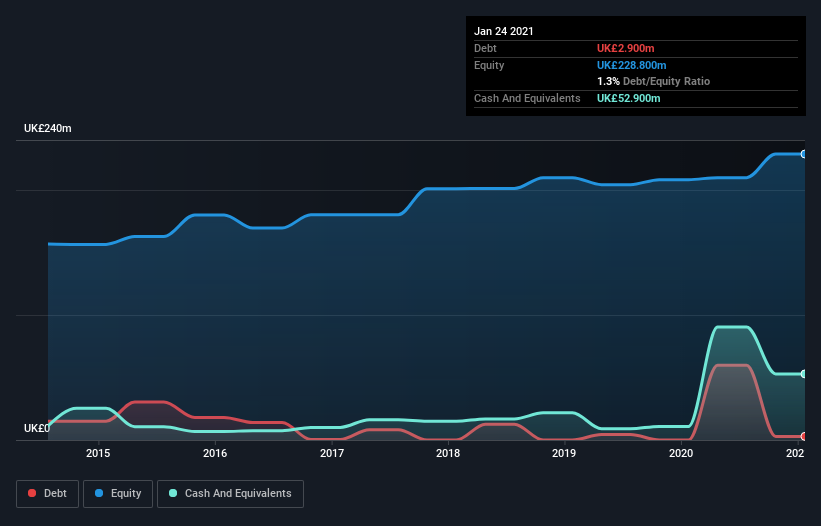Warren Buffett famously said, 'Volatility is far from synonymous with risk.' When we think about how risky a company is, we always like to look at its use of debt, since debt overload can lead to ruin. As with many other companies A.G. BARR p.l.c. (LON:BAG) makes use of debt. But the more important question is: how much risk is that debt creating?
When Is Debt A Problem?
Generally speaking, debt only becomes a real problem when a company can't easily pay it off, either by raising capital or with its own cash flow. Part and parcel of capitalism is the process of 'creative destruction' where failed businesses are mercilessly liquidated by their bankers. However, a more frequent (but still costly) occurrence is where a company must issue shares at bargain-basement prices, permanently diluting shareholders, just to shore up its balance sheet. Having said that, the most common situation is where a company manages its debt reasonably well - and to its own advantage. The first thing to do when considering how much debt a business uses is to look at its cash and debt together.
See our latest analysis for A.G. BARR
How Much Debt Does A.G. BARR Carry?
The image below, which you can click on for greater detail, shows that at January 2021 A.G. BARR had debt of UK£2.90m, up from none in one year. But it also has UK£52.9m in cash to offset that, meaning it has UK£50.0m net cash.

How Healthy Is A.G. BARR's Balance Sheet?
Zooming in on the latest balance sheet data, we can see that A.G. BARR had liabilities of UK£49.4m due within 12 months and liabilities of UK£23.9m due beyond that. Offsetting these obligations, it had cash of UK£52.9m as well as receivables valued at UK£38.3m due within 12 months. So it can boast UK£17.9m more liquid assets than total liabilities.
This short term liquidity is a sign that A.G. BARR could probably pay off its debt with ease, as its balance sheet is far from stretched. Simply put, the fact that A.G. BARR has more cash than debt is arguably a good indication that it can manage its debt safely.
On the other hand, A.G. BARR's EBIT dived 12%, over the last year. We think hat kind of performance, if repeated frequently, could well lead to difficulties for the stock. The balance sheet is clearly the area to focus on when you are analysing debt. But ultimately the future profitability of the business will decide if A.G. BARR can strengthen its balance sheet over time. So if you're focused on the future you can check out this free report showing analyst profit forecasts.
Finally, while the tax-man may adore accounting profits, lenders only accept cold hard cash. A.G. BARR may have net cash on the balance sheet, but it is still interesting to look at how well the business converts its earnings before interest and tax (EBIT) to free cash flow, because that will influence both its need for, and its capacity to manage debt. Over the last three years, A.G. BARR recorded free cash flow worth a fulsome 90% of its EBIT, which is stronger than we'd usually expect. That positions it well to pay down debt if desirable to do so.
Summing up
While we empathize with investors who find debt concerning, you should keep in mind that A.G. BARR has net cash of UK£50.0m, as well as more liquid assets than liabilities. The cherry on top was that in converted 90% of that EBIT to free cash flow, bringing in UK£44m. So we don't think A.G. BARR's use of debt is risky. When analysing debt levels, the balance sheet is the obvious place to start. However, not all investment risk resides within the balance sheet - far from it. For example - A.G. BARR has 1 warning sign we think you should be aware of.
Of course, if you're the type of investor who prefers buying stocks without the burden of debt, then don't hesitate to discover our exclusive list of net cash growth stocks, today.
If you’re looking to trade A.G. BARR, open an account with the lowest-cost* platform trusted by professionals, Interactive Brokers. Their clients from over 200 countries and territories trade stocks, options, futures, forex, bonds and funds worldwide from a single integrated account. Promoted
New: Manage All Your Stock Portfolios in One Place
We've created the ultimate portfolio companion for stock investors, and it's free.
• Connect an unlimited number of Portfolios and see your total in one currency
• Be alerted to new Warning Signs or Risks via email or mobile
• Track the Fair Value of your stocks
This article by Simply Wall St is general in nature. It does not constitute a recommendation to buy or sell any stock, and does not take account of your objectives, or your financial situation. We aim to bring you long-term focused analysis driven by fundamental data. Note that our analysis may not factor in the latest price-sensitive company announcements or qualitative material. Simply Wall St has no position in any stocks mentioned.
*Interactive Brokers Rated Lowest Cost Broker by StockBrokers.com Annual Online Review 2020
Have feedback on this article? Concerned about the content? Get in touch with us directly. Alternatively, email editorial-team (at) simplywallst.com.
About LSE:BAG
A.G. BARR
Manufactures, distributes, and sells soft drinks and cocktail solutions in the United Kingdom and internationally.
Flawless balance sheet with solid track record and pays a dividend.
Similar Companies
Market Insights
Community Narratives



